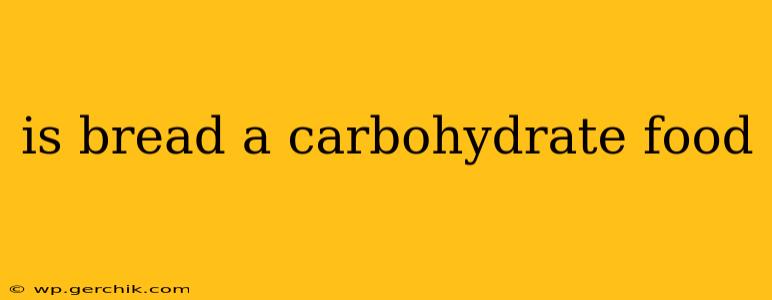Is Bread a Carbohydrate Food? A Deep Dive into Bread's Nutritional Makeup
Yes, bread is primarily a carbohydrate food. This isn't just a simple yes or no answer, though. Understanding why bread is considered a carbohydrate and the nuances of different types of bread is crucial for making informed dietary choices. This article will explore the carbohydrate content of bread, delve into different types, and address common questions surrounding its nutritional value.
What are Carbohydrates, and Why are They Important?
Before we dive into bread specifically, let's define carbohydrates. Carbohydrates are one of the three macronutrients (along with protein and fat) that provide our bodies with energy. They're broken down into glucose, which fuels our cells and allows us to function. Different carbohydrates are digested and absorbed at varying rates, influencing blood sugar levels.
Bread, in its various forms, is largely composed of carbohydrates derived from grains like wheat, rye, barley, or oats. The processing of these grains significantly affects the final carbohydrate content and its impact on our bodies.
What Types of Carbohydrates are in Bread?
Bread contains primarily complex carbohydrates, also known as starches. These are long chains of sugar molecules that take longer to digest than simple carbohydrates (like sugars). This slower digestion generally leads to a more gradual rise in blood sugar levels compared to simple carbohydrates. However, the type of flour used significantly impacts the type and quantity of carbohydrates present.
-
Whole Wheat Bread: Contains more fiber, vitamins, and minerals than white bread due to the inclusion of the entire wheat kernel. This fiber contributes to a slower release of glucose into the bloodstream, making it a more beneficial choice for blood sugar management.
-
White Bread: Primarily made from refined flour, which has had the bran and germ removed. This process strips away much of the fiber and nutrients, leaving behind mostly starch. White bread, therefore, tends to be digested more quickly, leading to a more rapid spike in blood sugar levels.
-
Rye Bread: Often higher in fiber than white bread, though not always as high as whole wheat. It also offers a unique flavor profile and nutritional composition.
-
Sourdough Bread: The fermentation process in sourdough bread can break down some of the complex carbohydrates, potentially making it easier to digest for some individuals. It can also have a lower glycemic index than other bread types.
How Many Carbohydrates are in a Slice of Bread?
The carbohydrate content varies widely depending on the type of bread. A single slice of white bread might contain around 15 grams of carbohydrates, while a slice of whole-wheat bread could have upwards of 20 grams due to the higher fiber content. Always check the nutrition label on your specific bread product for accurate information.
Is Bread Bad for You?
Bread isn't inherently "bad" for you. The health impact depends significantly on the type of bread and how it's incorporated into your overall diet. Choosing whole-grain breads over refined breads is generally recommended due to their higher fiber and nutrient content. Fiber promotes healthy digestion and can help regulate blood sugar levels. However, consuming excessive amounts of bread, regardless of type, can contribute to weight gain if not balanced with other healthy food choices and sufficient physical activity.
What are the Alternatives to Bread?
Many alternatives exist for those seeking to reduce or modify their bread consumption. These include:
-
Gluten-free bread: Made from alternative flours like rice flour, almond flour, or other gluten-free grains. Nutritional content varies greatly between brands.
-
Other grains: Quinoa, rice cakes, tortillas (whole wheat varieties are preferable), and potatoes can be used as carbohydrate sources.
-
Vegetables: Many vegetables such as sweet potatoes or squash can also serve as carbohydrate sources and offer additional health benefits.
In conclusion, bread is a carbohydrate food, but not all breads are created equal. Making informed choices about the type of bread consumed—opting for whole-grain options—and incorporating it mindfully into a balanced diet is key to maximizing its nutritional benefits and minimizing any potential negative impacts. Remember to always read food labels to understand the nutritional composition of the bread you choose.
